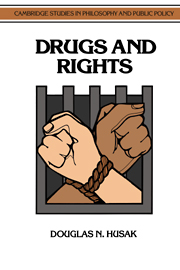Introduction
Published online by Cambridge University Press: 05 June 2012
Summary
This book does not propose yet another solution to our nation's intractable drug problem. As H. L. Mencken is reputed to have said about the alcohol problem during the era of prohibition, “No intelligent man believes the thing is soluble at all.” Whether or not the drug problem can be solved, many commentators have addressed the issue from the perspective of social policy. I have little new to add to their discussions.
I approach drug use from an individual rather than a social perspective. My central concern is to identify the moral rights of adult users of recreational drugs. I discuss social policy only insofar as it has a bearing on these rights. Moral rights have been all but ignored both by the state in its war on drugs and by theorists who have written, oftentimes critically, about this war. It is easy to see why rights are neglected by a state at war. What is more difficult to understand is why commentators have been so passive in calling attention to this neglect. Those scholars who have dissented in the war on drugs are seldom motivated by a desire to protect the rights of drug users. More frequently they have protested that the war cannot be won, or that it is too costly, or that it exacerbates the very problems it is designed to solve.
- Type
- Chapter
- Information
- Drugs and Rights , pp. 1 - 8Publisher: Cambridge University PressPrint publication year: 1992



